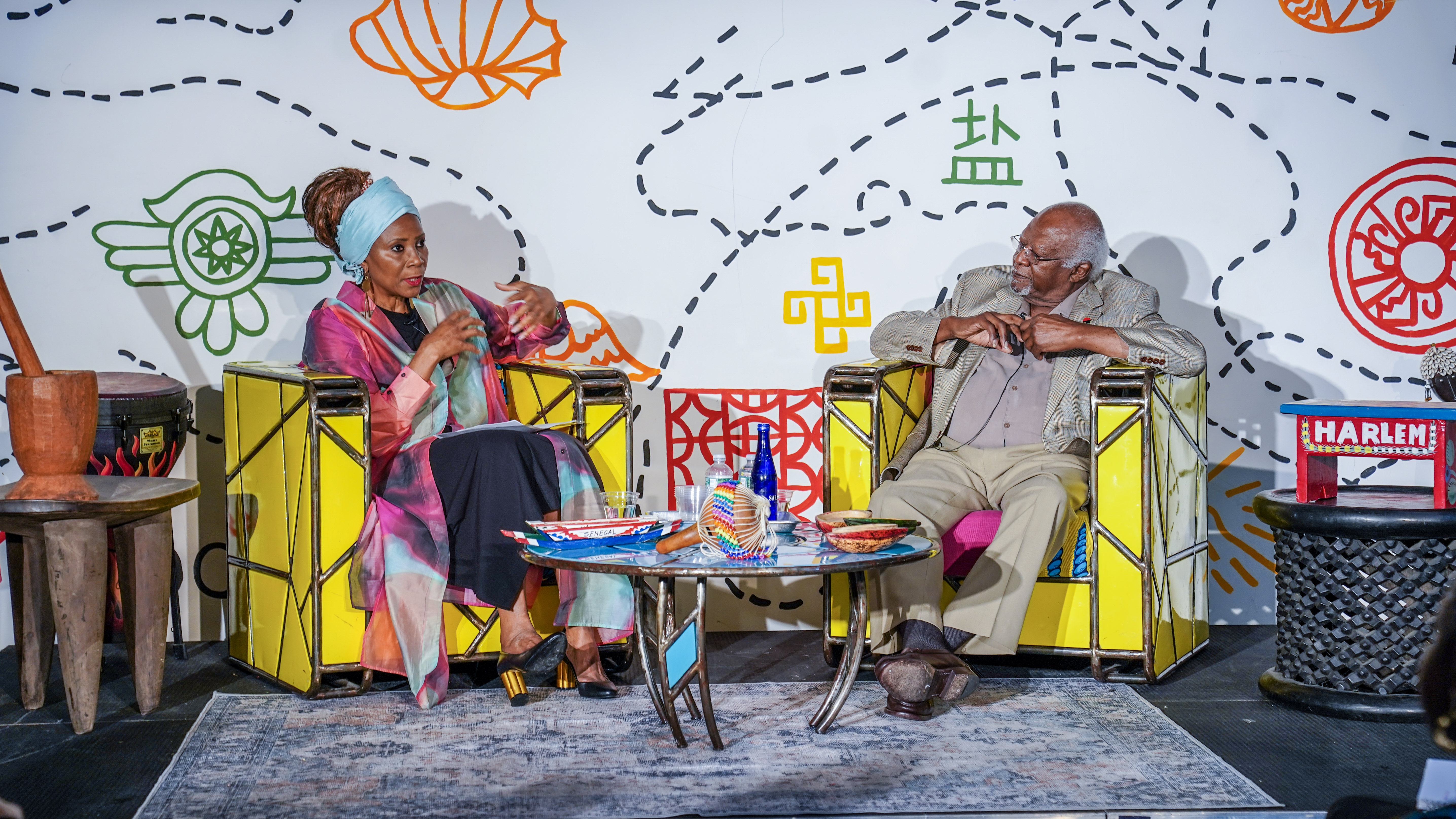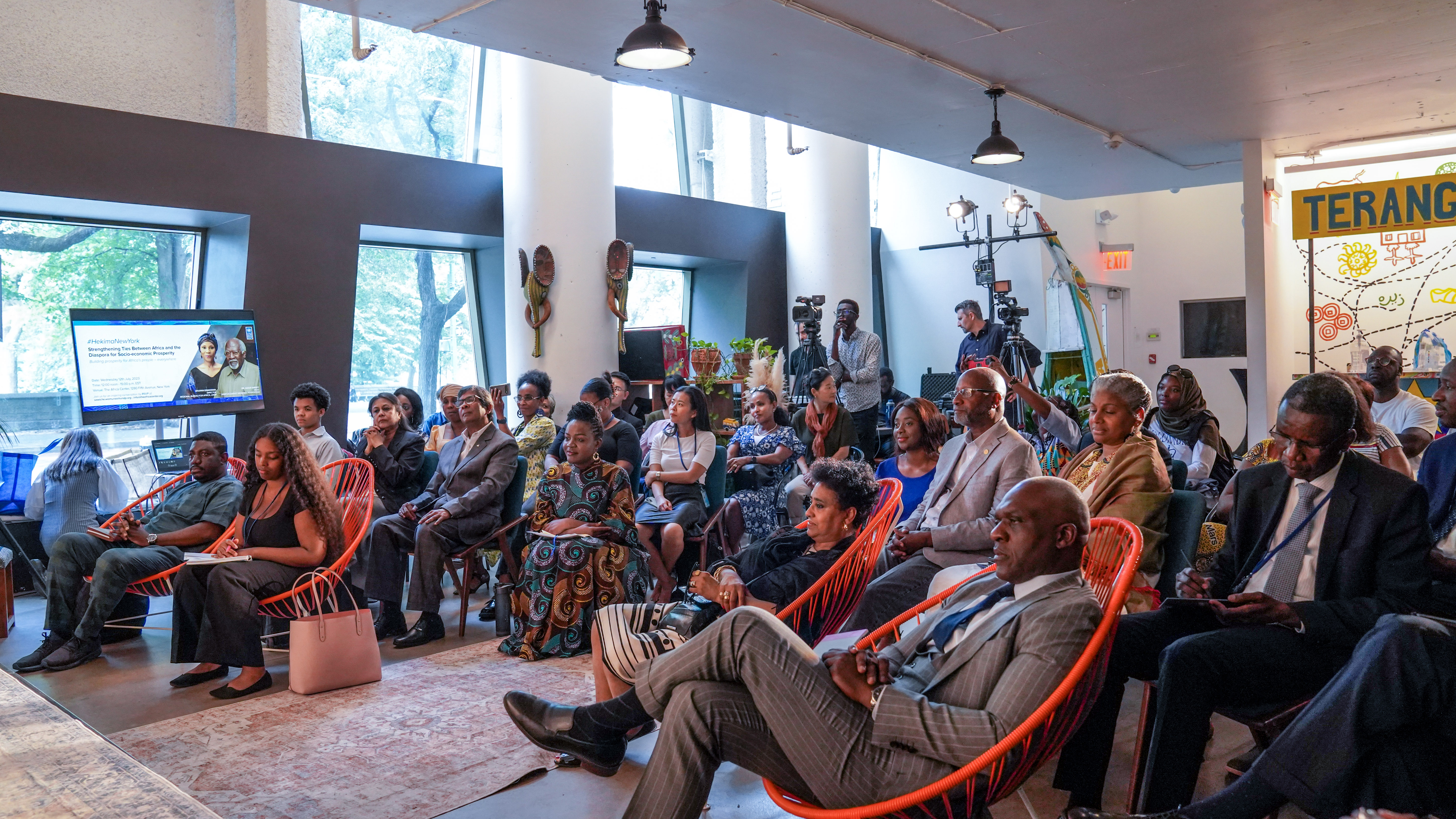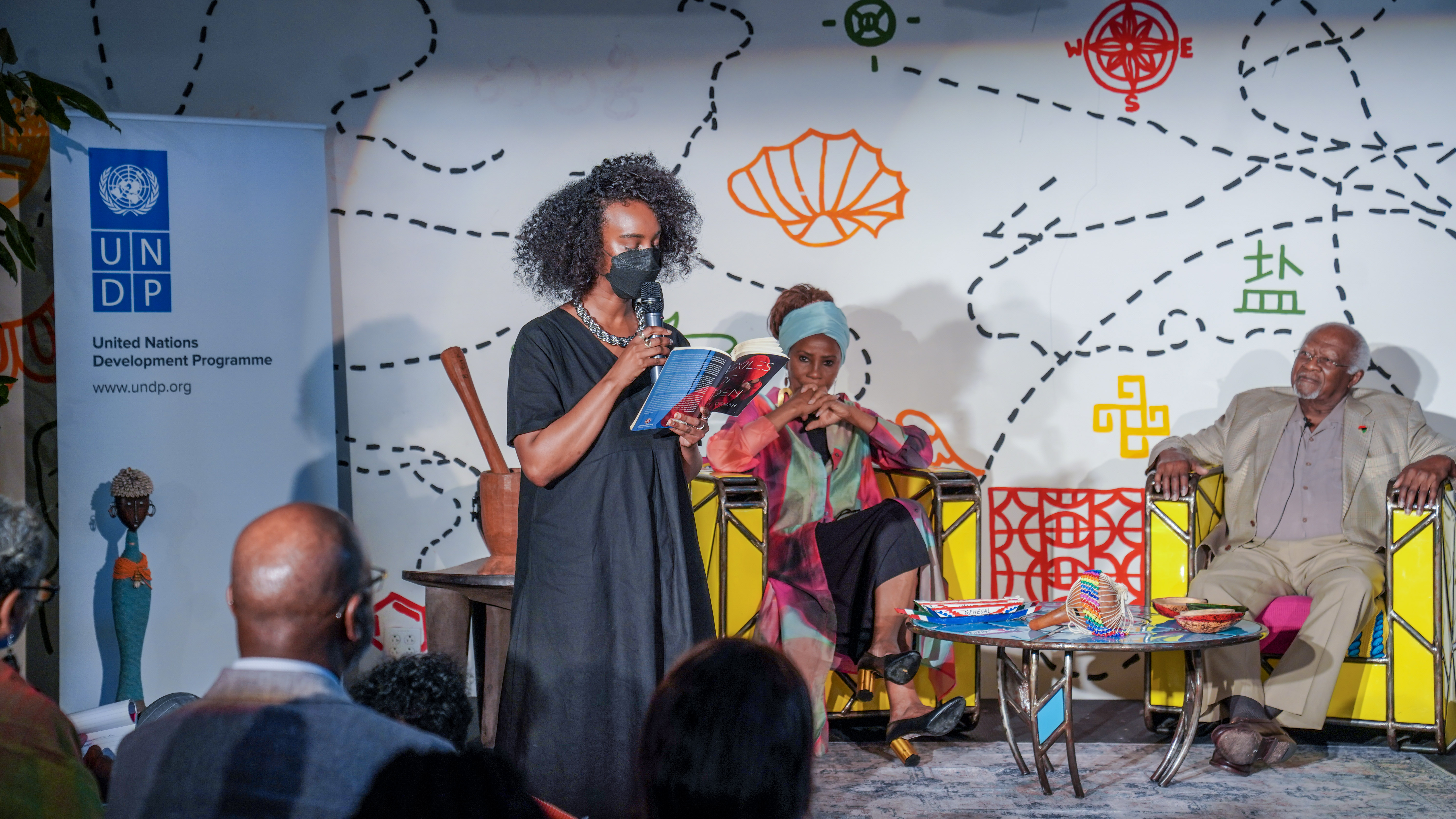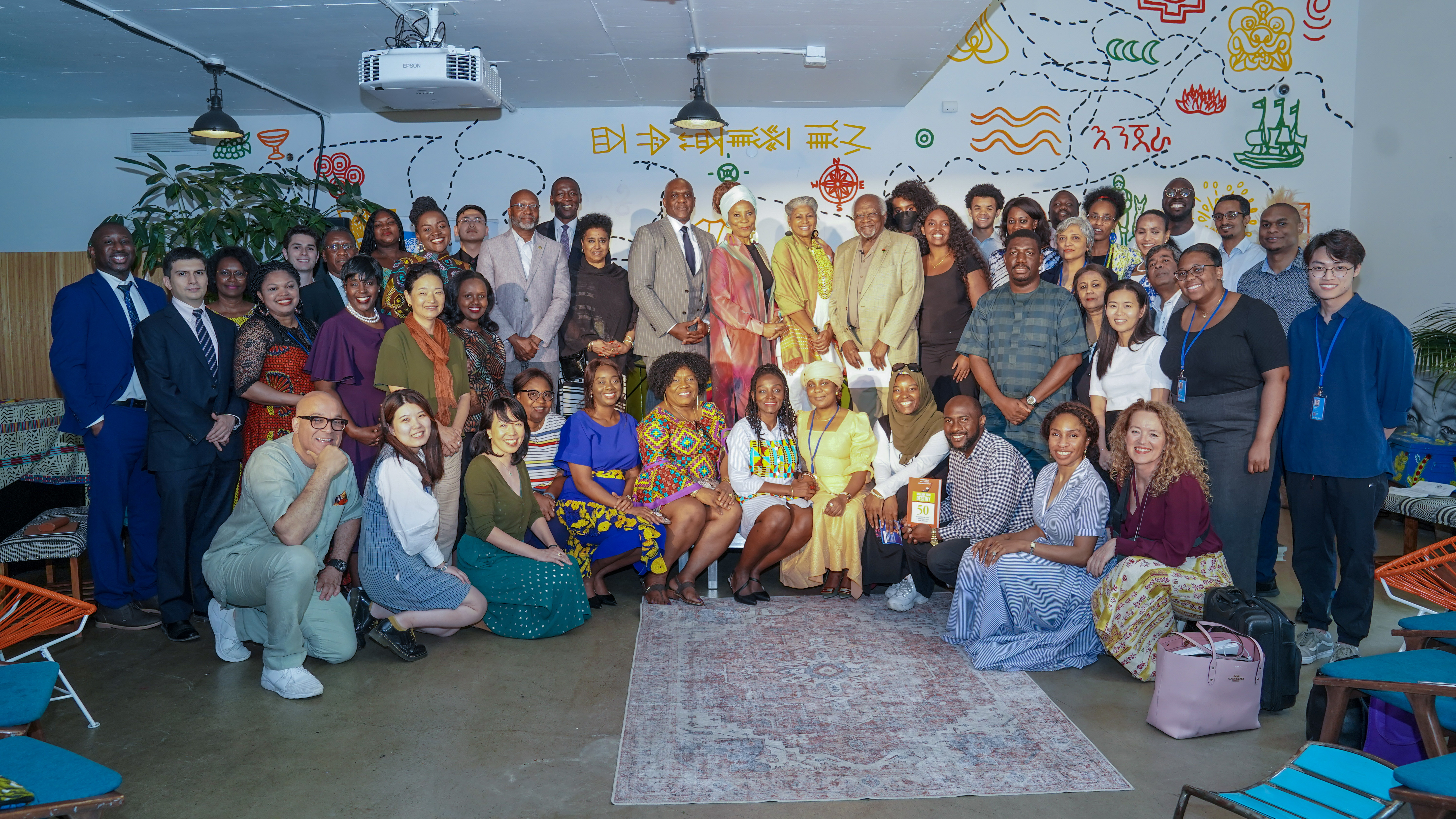Strengthening Ties Between Africa and the Diaspora for Socio-Economic Prosperity: Building Prosperity for Africa’s People – everywhere
August 13, 2023

Ms. Ahunna Eziakonwa with Dr. Julius W. Garvey at Hekima New York
On July 12, 2023, the United Nations Development Programme’s (UNDP) Hekima series arrived in New York as part of the African Influencers for Development Initiative (#AI4Dev). Hosted at the multi-functional Africa Center in East Harlem, the space was alive with inter- generational verve; the images and incisive words of African luminaries, past and present, from across the continent adorned its walls, imbuing every moment with the weight of rich insight and aspiration. Hekima, thus, appeared as a fitting name - translating to “wisdom” in Swahili.
Ms. Ahunna Eziakonwa— UNDP Assistant Administrator and Director of the Regional Bureau for Africa (RBA)—presided over the afternoon discussion, sharing the limelight with special guest Dr. Julius W. Garvey, retired cardiothoracic surgeon, medical professor, and son of United Negro Improvement Association (UNIA) founder Marcus Garvey and activist Amy Jacques Garvey. The topic of discussion bridged the Atlantic in much the same way Dr. Garvey’s father had endeavored in 1916 when he trekked northward from his native Jamaica to New York. Ultimately, despite the passage of time, the setting and central query remained unchanged: how could the ties between Africa and its Diaspora be strengthened for socioeconomic prosperity?

The audience looks on at the Hekima fireside chat
An opportunity-based framing of any partnership or initiative is foundational to the work of UNDP Africa. By emphasizing dignity, justice, and equality in such collaborations, the conversation strove to conquer what the Assistant Administrator termed the “negativity obstacle” for Africa through investment in agency and empowerment to break cycles of dependency. For Dr. Garvey and other contributors, answering this question was an exercise in self-reflection and historical memory. By realising Marcus Garvey’s century-old dream of a true alliance between Africa and the over 170-million-person African Diaspora, the continent’s boundless potential could finally be unlocked.
Hekima’s New York debut was also significant as it represented just the event’s second in-person iteration (and fourth overall occurrence) in the three years since the program’s summer 2020 debut. Amidst the global pandemic milieu, the first two conversations took place virtually, with one including the Nobel Laureate Professor Wole Soyinka assessing a range of transformational solutions for a new Africa around an ethos of shared humanity and the other hosting the first female President of Liberia and Nobel Laureate, H.E. Ellen Johnson Sirleaf, who outlined how the continent could build back stronger after COVID-19. Two weeks earlier, in the historic city of Accra, Ghana, Hekima premiered in front of a live audience, with Ms. Eziakonwa examining the prospects for private-public partnerships to accelerate Africa’s economic transformation in conjunction with Dr. Kingsley Yeboah Amoako, Founder and President of African Center for Economic Transformation and Former Executive Secretary of the Economic Commission for Africa (ECA).

Poet Ladan Osman recites excerpts from her award-winning 2019 book Exiles of Eden
Recognising the momentousness of Hekima’s advent in New York and the Garvey family’s fecund legacy of transcontinental activism— from Harlem to the homeland—underscored the event’s gravity and the participants’ sage insights. International journalist, Mark Eddo, opened the discussion alongside Somali-American poet Ladan Osman, who recited excerpts from her award-winning 2019 book “Exiles of Eden.” Dr. Julius Garvey then began on a philosophical note deconstructing the very notion of an African. Beyond appearance, nationality, or creed, he asserted that an “African” was principally described by the content of their character, their consciousness as one soul among billions, and their relationship to the creator and nature. This definition was inherently flexible, welcoming all in the Diaspora far-flung from their continental source by choice or force. Though an Afro-Caribbean by birth, Marcus Garvey discovered in himself an inextricable link to Africa, a place he came to view as a wellspring of salvation, particularly for those subject to rampant racism, disenfranchisement, and anti- Black violence in the early 20th century. Under these Pan-African auspices, Marcus Garvey founded the Black Star Line (BSL, 1919-22) steamship corporation to ensure African self-sufficiency from the bottom up. BSL was integral to Garvey’s larger effort to encourage Black self-determination and economic independence and escape exploitation and exclusion from the global economy. The BSL aimed to ship goods from across the African Diaspora, fostering a self-reliant and resilient global Black economy while transporting emigrants across the Atlantic to establish a Black nation-state. Garvey derived the BSL’s raison d’être from his early engagement with Booker T. Washington, including his autobiography, “Up from Slavery,” which he encountered during his first London sojourn from 1912-14. While the Black Star Line ships never reached African shores, their symbolism as paragons of Black self-determination, business ownership, and economic potential transcends Garvey’s initial vision.

Attendees gather for a group picture at the conclusion of the Hekima New York event
Dr. Julius Garvey and Ms. Eziakonwa then delved into the main challenges affecting Africa—such as poor educational outcomes for youth, weak political and economic cooperation, limited investment, and gender discrimination—and how improved alignment with the Diaspora could contribute to solutions. Julius Garvey proposed measures like the standardization of currency, the institution of free movement across the continent, the association of African universities with their Diaspora counterparts, de- risking of investments (especially for fiscal support from the Diaspora, which, in 2021 remittances, was more than double the $35 billion given in development aid to Africa), and women’s empowerment through high-level skills exchanges.
Following the fireside chat, testimonial reflections were shared from Howard Law Professor John Woods, founder of the Garvey- Nkrumah Fellowship Program, Arsema Aklog, UNDP RBA summer intern, and Harvard College student, Dr. Yvan Ilunga, Assistant Professor of Political Science and International Relations at Salve Regina University, and H.E. Sophia Tesfamariam, Permanent Representative to the UN for Eritrea. Professor Woods keyed in on the apprenticeship program he inaugurated, which brings American students from Historically Black Colleges and Universities (HBCUs) with peers from Caribbean and African-based institutions, serving as a law firm and public policy consortium for the Diaspora. Arsema shared a compelling anecdote about her impactful experience as an Ethiopian-American returning to her birthplace to emphasize the outsized effect that investing in such opportunities can merit for African Diaspora youth. Dr. Ilunga explored the issues of trust and humanity between native Africans and the Diaspora and how a shared conceptualization of a prosperous future could harmonize disparate viewpoints. Finally, H.E. Ambassador Tesfamariam returned to the abstract concept of an African earlier raised by Dr. Julius Garvey, chronicling her story as an Eritrean who had grown up in Ghana and Tanzania yet still preserved this core national identity in her heart and mind through Eritrean cultural remittances like festivals and celebrations.
After brief words from Mark Eddo and Ladan Osman, Dr. Garvey and Ms. Eziakonwa concluded on a totalizing note, sharing their desire to spread a new paradigm of African humanism to the world and the need to strengthen diaspora ties through education, trade, investment, and cultural exchanges, accelerating the SDGs and the African Union’s Agenda 2063. This summation drew on Marcus Garvey’s guiding tenet to bring those historically left behind to their rightful seat at the global table and celebrate the intellectual wealth of Africa and its Diaspora.
#HekimaSeries is a UNDP African Influencers for Development Platform holding space for African solutions to accelerate the continent’s attainment of the SDGs and the AU’s Agenda 2063 – The Africa We Want.
This report was written by Nicolas Pantelick – RBA summer intern and Harvard College senior.

 Locations
Locations



